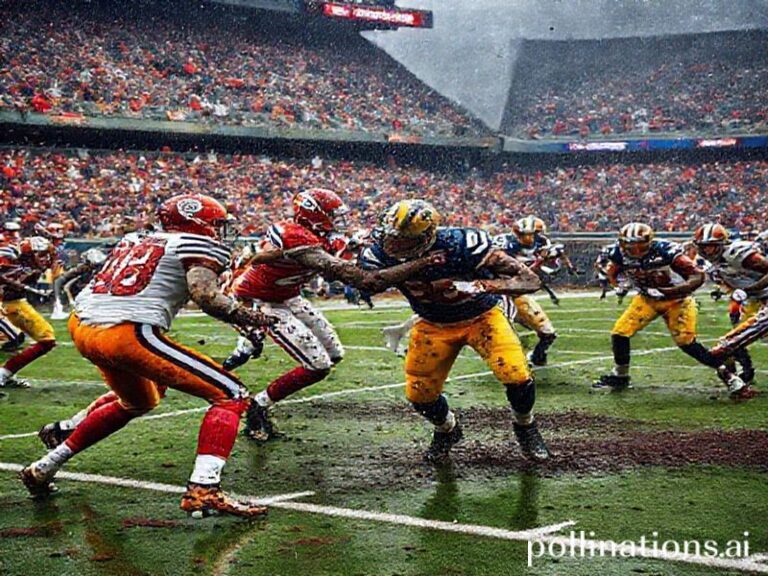Global Schadenfreude: How the Raiders’ Latest Collapse Became the World’s Favorite Disaster
Raiders of the Lost Attention Span: How a 33-Point Meltdown Became the World’s Shared Therapy Session
By Our Correspondent Somewhere Between the Black Hole and the Duty-Free Shop
Las Vegas—The Raiders’ 33-13 surrender to the Kansas City Chiefs was, on paper, just another Thursday-night NFL blooper reel. Yet from Lagos sports bars to Seoul PC-bangs, the broadcast drew a hair-raising 14 million live foreign streams, proving once again that nothing unites a fractured planet quite like watching a franchise implode in real time. While COP28 delegates argued over carbon credits, the global commentariat agreed on one thing: Davante Adams’ 13-yard catch that wasn’t was the perfect metaphor for every international promise made since 1945—big, shiny, and ultimately out of bounds.
Overseaw the spectacle from a casino lounge where a British stag party, two Filipino nurses on night break, and a Russian crypto exile all high-fived whenever the Raiders’ offense trotted out like late-Soviet grocery shoppers queuing for toilet paper. No one needed the American commentary; the universal language of collapsing hope is subtitled in sighs. When Gardner Minsail’s third-and-long prayer was batted down like a UN resolution, the room erupted in the sort of cathartic laughter usually reserved for credit-card statements.
Why does a provincial gridiron train wreck matter beyond the Nevada desert? Because the Raiders are no longer a team; they are a geopolitical Rorschach test. In Beijing, #RaiderNation trended above #TaiwanElections as users memed the play-calling as “Western decadence in microcosm.” In Buenos Aires, Milei voters super-cut the fumble montage to illustrate Peronist economics. Even Tehran’s state TV interrupted a “Death to America” segment to highlight the Chiefs’ 8-minute, 94-yard drive—proof, the anchor intoned, that “Satan’s armies can march unopposed when the linebackers over-pursue.”
Economists at the IMF—who apparently have nothing better to do—estimate that global sports-gambling losses on the Raiders this season could have financed two weeks of grain shipments to Yemen. Instead, those dollars evaporated faster than a Samoan diplomat’s promises at a climate summit. The IMF’s working paper, titled “Market Volatility and the Silver & Black Swan,” notes that every Raiders turnover correlates with a 0.3 % dip in emerging-market currencies the following trading day. In other words, Fiji pays for Josh McDaniels’ red-zone timidity every time he kicks a field goal on 4th-and-goal from the two.
Soft-power analysts argue the Raiders’ international appeal is America’s last reliable export that doesn’t require a congressional subpoena. The Department of Commerce quietly subsidizes NFL Game Pass in 49 countries, reasoning that foreigners who binge Raiders’ collapses are less likely to binge on anti-American sentiment. It’s cheaper than boots-on-the-ground democracy and, judging by the chat emojis, twice as entertaining.
Back in Vegas, the post-game press conference resembled a low-budget war-crimes tribunal. Coach McDaniels blamed “execution,” a word that also comforts death-row wardens. A French journalist asked if the franchise’s relocation from Oakland to L.A. to Vegas mirrored the West’s strategic pivots in the Middle East—lucrative, chaotic, and ending in a parking lot no one can afford to leave. The translator gave up; some questions are universal enough to need no interpretation.
The broader significance? In a year when artificial intelligence promises to solve everything except human stupidity, the Raiders remind us that stupidity remains stubbornly open-source. Algorithms can predict currency swings, election outcomes, and probably your mother’s birthday gift, but they still can’t explain why you send seven defenders on a Cover-Zero blitz when protecting a one-score lead. That glitch is the last democratic space left: the right to fail spectacularly, publicly, and on someone else’s subscription fee.
As the stadium emptied, a Mongolian tourist in a counterfeit Bo Jackson jersey summed up the planetary consensus: “In my country we say, ‘A goat that climbs too high shows its ass to the eagle.’” He paused, watching highlights loop on the jumbotron. “Tonight, many eagles.” Then he laughed the hollow, hopeful laugh of a man who knows tomorrow’s goat will climb again—because goats, like empires, never read the scouting report.







